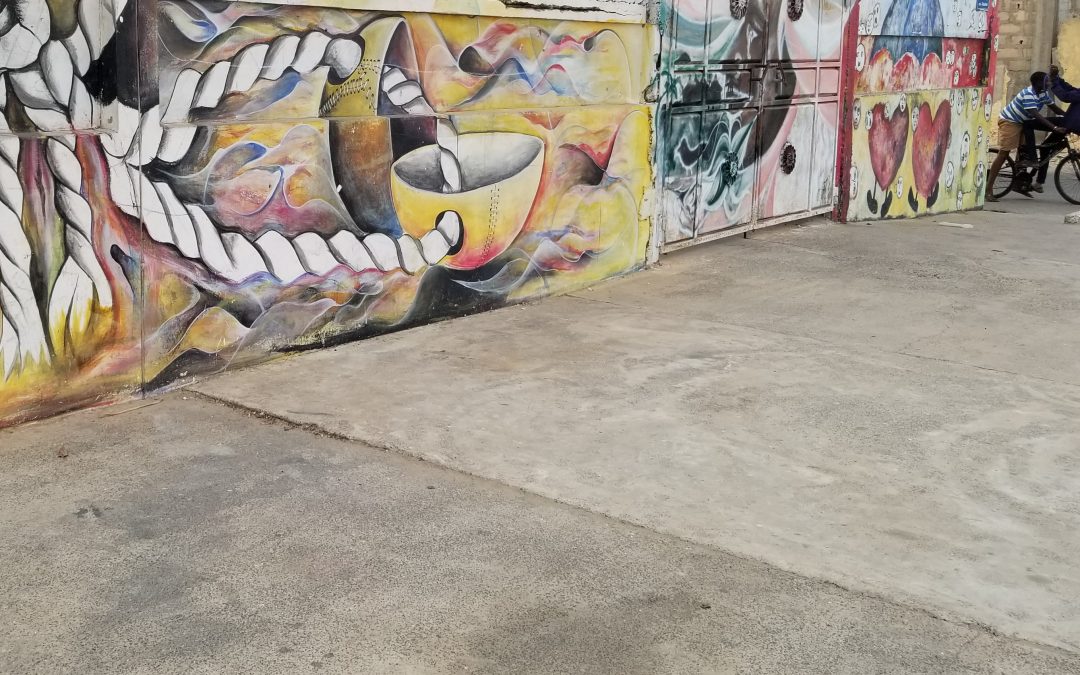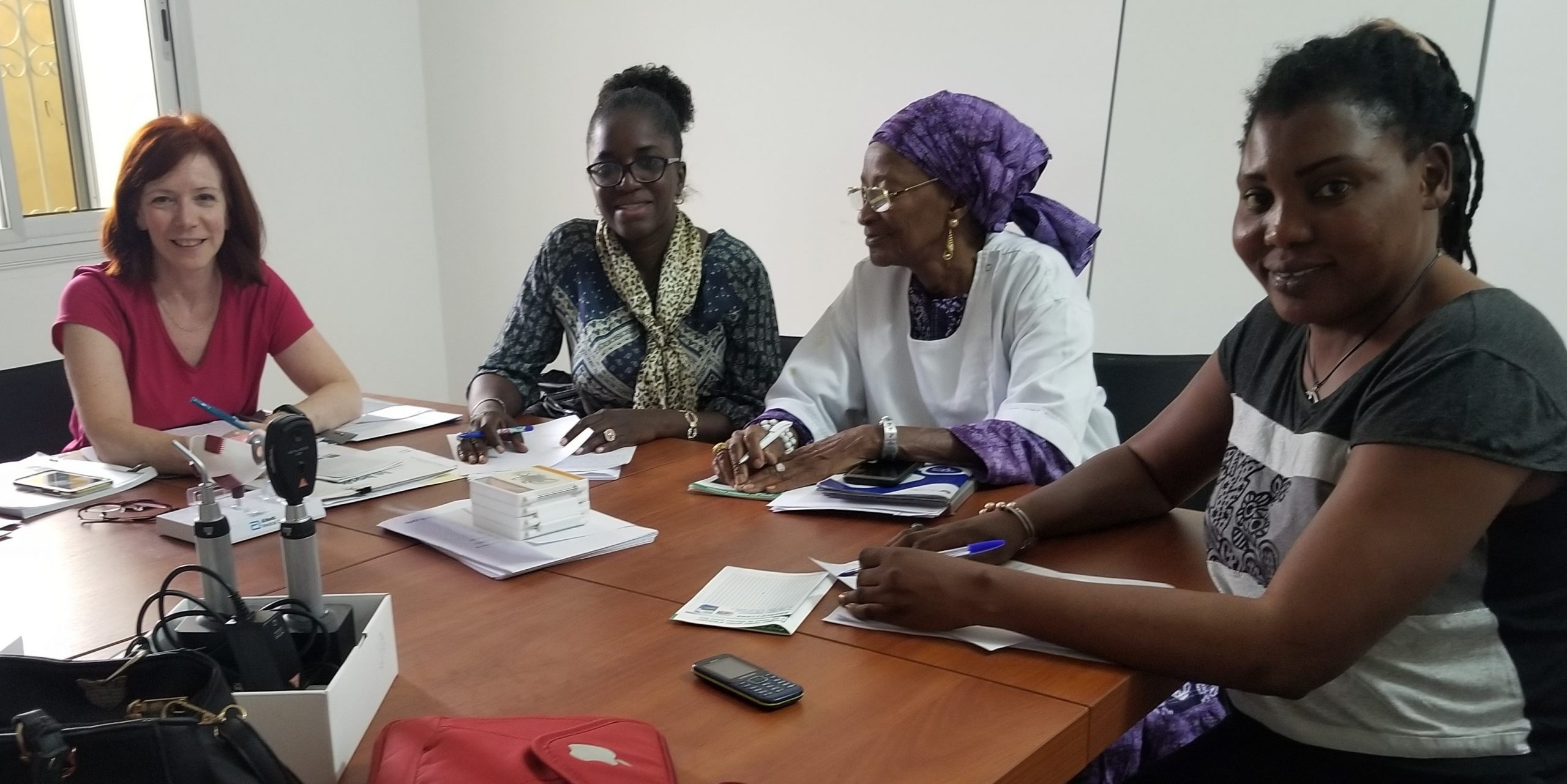Strengthening knowledge in Senegal
By Catherine Rioux, general management (in collaboration with Dr. Francine Lavallée, Optometrist)
From November 14 to 24, volunteers Dr. Francine Lavallée, Optometrist, and Sophie Duchesne, Optician, travelled to Africa to continue the primary eye care training for the team members of the new IRIS Mundial permanent program in Saint-Louis, funded by the “Ministère des Relations internationales et de la Francophonie (MRIF)“ of Quebec.
ANTICIPATING THE UNPREDICTABLE FROM THE OUTSET
The capacity to adapt, the proactivity to modify initial plans and open-mindedness are essential assets to possess on a foreign mission! IRIS Mundial volunteers know this well. They are selected on the basis of these qualities and are always well prepared for any unforeseen events that may occur on a mission. Dr. Lavallée and Ms. Duchesne were also not spared this time. No sooner had they departed, they would have to call on these qualities with several unexpected challenges to overcome.
First of all, after almost 25 hours of travel and connections, they finally landed in Dakar, the Senegalese capital. They were finally able to leave the airport by the end of the afternoon following some complications at customs because of the materials in their luggage. The change of scenery was already complete: desert landscapes under a blazing sun as well as a hot and dry climate. In addition, what was dreaded prior to departure became a reality: the volunteers learned from the partner at that time that the optometric instruments sent by boat more than two months prior were still stuck at customs in Dakar. They then understood that they would have to be creative and implement their alternate plan in the training program.
They had a five-hour car ride awaiting them before arriving in Saint-Louis. However, the car broke down 45 minutes before their arrival, forcing them to stop in the middle of the bush. “Nothing was visible on the horizon, except a beautiful moon and the call of a donkey in the dark,” said Ms. Duchesne. Fortunately, the Senegalese colleagues took care of the volunteers all the while ensuring their safety. The vehicle was towed to the nearest gas station with a rope. Meanwhile, they called the hotel and learned that no reservation was registered under their name despite their having called the week before to double-check. Luckily, they had access to a room that was still available. They finally arrived at 2 a.m. and went to bed exhausted from their adventures but relieved to have arrived at the desired destination!
TRAINING OBJECTIVES
Dr. Lavallée and Ms. Duchesne were mandated to review the staff’s knowledge of the previous training given in March 2019 and to continue their eye care training. The team consisted of two nurses, an optician and a manager. The nursing staff increased their understanding of refraction techniques which are used to determine the necessary prescription power of the lenses for any given patient. In addition to working on the management of ocular emergencies, they also benefited from an introduction to the use of slit lamps and ophthalmoscopy to examine the eye fundus of patients. The optician obtained new knowledge of ophthalmic lenses as well as fitting and repairing eyewear.
As per Dr. Lavallée: “The clinic is superb and well established. The team is efficient and the dynamic between the members is excellent. Everyone understands their role. A lot of work has been done on raising awareness and training teachers in the area on the importance of good vision. We are very proud to have met this team and we think that we have given them a lot of support. “
ACCESSIBILITY OF CARE, AT MORE THAN 100 KM
A visual screening day in a mobile clinic was planned, thus the trainers could observe the sequence of events, the quality of the team members’ interventions with patients and how awareness sessions were carried out. The two volunteers accompanied the partner to Richard Toll, a small mining town surrounded by sugar-cane fields located at more than 100 km from Saint-Louis. No eye care services are currently available there, so more than 125 people with severe vision impairment were registered at the clinic. Thus, the team worked very hard until 8:30 p.m. to provide the best care to each and every one of the patients! Among these, there were more than 60 visually- impaired or legally blind patients–far more than Dr. Lavallée and Ms. Duchesne expected. Several had the chance to benefit from the use of reading glasses and sunglasses and some will be operated free of charge.

The story of Babacar
Babacar is a 7 year-old boy with tropical endemic limbo-conjunctivitis, a common eye disease in the area that can lead to blindness if not treated. The staff took care of Babacar. This will prevent him from becoming visually handicapped (opaque cornea), as was the case for many young adults examined during the one-time project in November 2018.
Recommendations were made by the trainers to improve the running of these mobile clinics in the future. They also revisited the referencing criteria of patients requiring a more in-depth examination at the Saint-Louis community ophthalmology centre. In addition, a monthly ophthalmology consultation day was also organized during this training mission so that trainers could assess its organization and make recommendations to improve its effectiveness.
To conclude, the two trainers headed back home with a head full of beautiful memories and ideas for the next training in spring 2020. On her return, Dr. Lavallée expressed: “The hot African sun, immaculate blue skies, bushes, arid fields, majestic baobabs, small peasant villages, typical smells, donkeys, goats and fishing boats; this is what characterized the landscape unfolding under my eyes during the return to Dakar airport. I would like to thank Mamour, a very attentive Senegalese colleague who travelled with us. We happily returned to Quebec with the satisfaction of a job well done and fulfilled by the pleasant meetings we had…what welcoming people with big hearts! “










